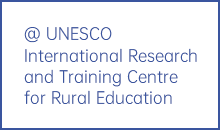In 2021, UNESCO released its new global report on the Futures of Education entitled Reimagining our futures together: A new social contract for education, overturning the long-held belief on human capital investment and the educational development paradigm built on individual competition, calling for global solidarity and cooperation, to redefine education as a social contract. As providers of education and key quality assurance agents, teachers have an indispensable position in any education discourse. Ensuring the supply of high-quality teachers is also one of the targets of the United Nations 2030 Sustainable Development Agenda Goal 4 (“SDG4”) (Target 4.c). However, with the continuous intensification of urbanization and the continuous loss of rural population, the shortage and high mobility of rural teachers also endanger the foundation of rural education. In this context, from the perspective of the future of education, the fourth session of the dialogue series by the UNESCO International Research and Training Centre for Rural Education (UNESCO INRULED) focused on “The Provision and Retention of Qualified Teachers: Governmental Responsibility or Social Contract?”. The discussion unfolds from five aspects: the status quo and challenges of teacher provision and retention, existing policy frameworks, social contract, the role of an individual teacher, and policy recommendations.
The dialogue was moderated by the chief expert of UNESCO INRULED, Professor Sang Guoyuan from Beijing Normal University. The speakers were Professor Teng Xing from Minzu University of China, Professor Li Jinyu from Northwest Normal University, Professor Qin Yuyou from Northeast Normal University, Professor Martin Valcke from Ghent University, Belgium, and Associate Professor Kibinkiri Eric Len from the University of Bamenda, Cameroon.
1. The current situation and challenges on the provision and retention of rural teachers in different countries
In China, the provision and retention of rural teachers is a highly policy-related issue due to the staffing of public institutions and the identification of national public officials for teachers. From the perspective of the provision, there are distinct contradictions between the supply and demand for rural teachers. "Provision" includes training methods, employment and career development, and "demand" includes the demand for quantity, structural requirements and teacher quality. The goal to be achieved by the policy of provision and demand for rural teachers in China is the "Policy in 9 Words", which is “Willing to go. Willing to stay. Be great teachers”. However, such policy expectations only consider the willingness to go, to stay, and to teach, while ignoring the issues of “entrance and exit”. The "entrance" question is: who is supplying teachers to the village? As the main source of teacher supply, Chinese normal universities can be categorised into three levels. The first level is those universities affiliated with the Ministry, which trains high-level teachers for the entire country, which includes special projects to train teachers in rural areas, such as public-funded normal students and excellent teacher programs. The second is the provincial normal universities, which train teachers for the province, county and city. The local colleges and universities in the third level are the main bodies of rural teacher supply. The Ad Hoc Post Teachers Program implemented in the central and western regions of China has also become the main channel for the supply of rural teachers. The supply of rural teachers is mainly realized in the form of state leadership and planning and is less related to the "demand" of the countryside. Therefore, it is more prone to the contradictions between the provision and demand of rural teachers at the policy stage.
Although the government has made many efforts in the provision and retention of rural teachers and the number of rural teachers has continued to increase, the teaching force in rural China still faces some challenges. For example, there is a structural shortage of teacher supply in ethnic minority areas. In Gannan, Gansu, and Tibetan schools, there is a lack of science teachers. Teachers who teach physics, chemistry, and mathematics are usually those who specialise in the Tibetan language. There is a shortage of talents who can use minority languages to teach professional subjects, and the phenomenon of “one does not do what one has learned” is common in areas with a large ethnic minority population. In addition, the existing rural teacher provision support policies are mostly short-term projects, lacking long-term institutional arrangements. Moreover, the training of rural teachers is not well targeted, and the attention on rural teachers' policy is not sufficiently refined.
Cameroon and other African countries are also facing the loss of rural teachers. The income of rural teachers is lower than that of urban areas, and the facilities of rural schools are disadvantaged, pushing many rural teachers to migrate to the cities. In general, the teaching profession is no longer attractive, and most of the top graduates from higher education institutions choose other professions. At the same time, the population of Cameroon is increasing rapidly, and the annual population growth rate far exceeds the increase in the proportion of qualified teachers, exacerbating the shortage of teacher supply.
Unlike China, for Belgium and other Western European countries, families with better economic backgrounds tend to choose schools in suburban and rural areas, while families with lower socioeconomic levels mostly live in urban areas with extreme diverse language and cultural backgrounds. The challenges facing urban areas are even greater. In many urban schools, the supply of teachers faces three problems: one is the decline in the number of students enrolled in the teaching profession, the second is the low quality of students entering the teaching profession, and the third is the uneven gender ratio of teachers. In terms of retention, the number of teachers in European countries has been decreasing by 1.5% each year, where 40% of new teachers have left their teaching positions within 5 years of their employment, and 4% of the teaching staff teachers do not have sufficient teaching qualifications.
2. Strategies at the government level to ensure the provision and retention of rural teachers in different systems
In order to remedy the shortage of rural teachers, China has made continuous efforts. At present, the main policies and projects for the supply of rural teachers are as follows:
In 2006, the central government and the provincial government launched the “Ad Hoc Post Teacher Program”, which has been continuously implemented and gradually expanded, and has become the main means of staffing the current rural teacher team;
From 2015 to 2020, the State Council of China promulgated the "Rural Teacher Support Plan" to inject vitality and provide material foundation for the construction of the rural teacher cohort;
In 2018, the General Office of the State Council of China issued guidelines on comprehensively strengthening the construction of small-scale rural schools and township boarding schools, providing targeted and dimensioned teacher support for two types of key schools in rural areas.
The positive impact of these policies is worthy of recognition, but due to the wide distribution and high diversity of villages and towns in China, the implementation of these policies varies in different regions. At the same time, in the process of urbanization, China's rural areas are facing many new problems. These changes sometimes leaves behind the goals and results of relevant policies, which in turn weakens the effectiveness of policies to a certain extent, but this also means that rural areas are under rapid changes.
In Belgium, the government has adopted a series of short-term and long-term measures to support teacher supply. The short-term measures mainly focus on changes on teacher salaries and occupational requirements. These include ensuring teacher supply by lowering the recruitment standards for primary teachers, using high salaries to attract teachers from the private market, encouraging secondary school teachers to extend working hours and get extra salaries, adjusting the qualifications required for high school teachers by replacing the requirement of teaching certificate with a professional graduate degree to attract more candidates. The long-term policy, starting with school management and teacher development, bringing together schools in the same area to recruit teachers together, and allowing teachers to rotate between different schools, has had positive impacts. In terms of teacher development, Belgium divides teachers' occupational levels into "junior teachers", "experienced teachers" and "key teachers", so that teachers can receive differentiated professional training and development. At the same time, the content of teachers' work is divided and assigning the work other than the core teaching content to other employees encourages teachers to focus mainly on teaching. This measure improves the professionalism of the teaching profession, and thus enhancing the attractiveness of the profession.
3. The power and contribution of social contracts and civil society on the provision and retention of rural teachers
The provision and retention of rural teachers is a social issue. In addition to the attention and intervention of the government, social forces also play an important role. Perseverance and dedication are often emphasised in traditional Chinese culture, which have gradually become the way rural teachers are recognised by the society. This kind of social contract has also been gradually incorporated into policies to increase the love and loyalty of rural teachers to their profession. Some policies encourage the determination of subsidies for rural teachers, evaluation of professional titles, and honorary awards based on the number of years they have served. In recent years, various civil society organisations have also invested in the construction and development of rural teachers based on their sympathy and concern for rural-urban disparities. With the help of social contract, based on their own educational philosophy and non-institutionalised methods from different dimensions, non-profit organizations play a supplementary and leading role in the provision and retention of rural teachers, and will encourage and attract more social contract to be involved in rural education and the development of rural teachers in the future.
Social contract plays a crucial role in educational development in Cameroon and other African countries. Many local organisations, international organizations and foreign governments have carried out pre-job training and professional skills training in Cameroon, focusing on the development of teachers' innovative skills. In addition, social contract also provides indispensable infrastructure and financial support for Cameroon's educational development.
4. The role and impact of individual teachers in the provision and retention of rural teachers
The provision and retention of rural teachers is not only a policy and social issue, but also an issue of the individual professional development and growth of teachers. The provision and retention of rural teachers is inseparable from the discussion of individual teachers. The predicaments teachers play and the possible roles that teachers themselves play in the rural teacher provision and retention system are worth paying attention to. The "push-pull theory" in migration can provide an analytical perspective for the mobility of rural teachers. The mobility of rural teachers is the result of the combined effects of "push" and "pull" at the levels of economy, culture, and customs brought about by different working and living environments. Therefore, the core of providing a theoretical basis for formulating long-term policy systems lies in clarifying the push and pull factors of cities and rural areas for teachers and the reasons behind. The individual career development and choice of rural teachers in China also face the following problems:
The problem of rural teachers' professional self-identity: the self-perception of individual or group rural teachers, their own professional identity and the establishment of professional confidence are the key topics in understanding and discussing the provision and retention of rural teachers. If these problems are not targeted, and if we only consider the problem from the perspectives of external policies, environmental systems, and treatment conditions, we will not reach the crux of the problem. Only when rural teachers truly establish a professional sense of achievement, value and dignity, can the problem of rural teachers be solved.
There are too many imaginations and expectations for rural teachers beyond their professional duties: since the promulgation of the Opinions on Strengthening the Construction of Rural Teachers in the New Era in 2020, many scholars have studied and discussed how rural teachers can become the "new rural talents" and ways to revitalise rural teachers. However, the problem of rural teachers is closely related to the problem of rural education, and it is more related to the issues of agriculture, the countryside, and farmers. The problem with rural education is the intersection of educational problems in rural areas and the problems with rural areas in education, especially the changes in social values and the establishment of market-oriented operation mechanisms. The urban centre takes the lead to solve the problem of rural teachers, which is arduous and challenging. "Rural teachers" is also a concept full of diversity, complexity, and variability. Such conceptual characteristics indicate that we cannot address rural teachers in isolation, nor should we imagine and expect non-professional duties for rural teachers.
Pay attention to the cultural suitability of rural teachers: in addition to the arrangements at the national level, teachers who can safely teach in the countryside must feel related to the community. Only those who have feelings for the countryside can take roots there. Therefore, it is best to cultivate rural students to become rural teachers who are personally related to the local culture.
5. Policy suggestions for the provision and retention of rural teachers in the future
Attracting outstanding talents to become rural teachers is a basic problem worthy of systematic thinking and solving in terms of recognition, system and policy. Who can become rural teachers? How to cultivate rural teacher? These problems at the source must be solved well, and it will only make sense if teachers can go to rural areas, stay in rural areas and teach well. On the basis of the "Policy in 9 words", it can be updated to "Expectation in 15 words", adding the “With high mobility. With promising developments”, so that the development of rural education will have a future. At the same time, we can learn from the experience of developed countries with high income and effective service period to solve the problem of rural teacher provision and retention. From the perspective of individual teachers and economics, the external environment in the field of education is the market economy, so the internal policies of education also need to reflect external policies. Reasonable economic compensation for rural teachers needs to be provided at the same time with policies and moral mobilization. Only in this way can we ensure the sustainable supply and development of rural teachers. Therefore, it is possible to provide additional transportation compensation, differentiated incentives for working conditions, and performance-based wages for teachers who go to the countryside. It is also necessary to ensure that the development opportunities of rural teachers are comparable to those of cities, and the true meaning behind perseverance is relised when rural teachers can say that “I could have left the countryside, but I chose to stay”.
Rural teachers are the "lamplighters" of the children. They are like torches of hope, bringing light and future to the children in the countryside. The government responsibility and social contract on the provision and retention of rural teachers is a key issue worthy of long-term attention from all stakeholders, and it is also an important factor in "Education for Rural Transformation". For a long time, UNESCO has paid special attention to the improvement of the quality of rural education, and UNESCO INRULED also hopes to contribute experience and lessons to the development of rural education in China and other developing countries.













